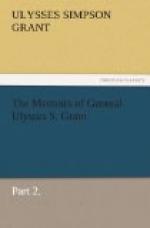The framers were wise in their generation and wanted to do the very best possible to secure their own liberty and independence, and that also of their descendants to the latest days. It is preposterous to suppose that the people of one generation can lay down the best and only rules of government for all who are to come after them, and under unforeseen contingencies. At the time of the framing of our constitution the only physical forces that had been subdued and made to serve man and do his labor, were the currents in the streams and in the air we breathe. Rude machinery, propelled by water power, had been invented; sails to propel ships upon the waters had been set to catch the passing breeze—but the application of stream to propel vessels against both wind and current, and machinery to do all manner of work had not been thought of. The instantaneous transmission of messages around the world by means of electricity would probably at that day have been attributed to witchcraft or a league with the Devil. Immaterial circumstances had changed as greatly as material ones. We could not and ought not to be rigidly bound by the rules laid down under circumstances so different for emergencies so utterly unanticipated. The fathers themselves would have been the first to declare that their prerogatives were not irrevocable. They would surely have resisted secession could they have lived to see the shape it assumed.
I travelled through the Northwest considerably during the winter of 1860-1. We had customers in all the little towns in south-west Wisconsin, south-east Minnesota and north-east Iowa. These generally knew I had been a captain in the regular army and had served through the Mexican war. Consequently wherever I stopped at night, some of the people would come to the public-house where I was, and sit till a late hour discussing the probabilities of the future. My own views at that time were like those officially expressed by Mr. Seward at a later day, that “the war would be over in ninety days.” I continued to entertain these views until after the battle of Shiloh. I believe now that there would have been no more battles at the West after the capture of Fort Donelson if all the troops in that region had been under a single commander who would have followed up that victory.
There is little doubt in my mind now that the prevailing sentiment of the South would have been opposed to secession in 1860 and 1861, if there had been a fair and calm expression of opinion, unbiased by threats, and if the ballot of one legal voter had counted for as much as that of any other. But there was no calm discussion of the question. Demagogues who were too old to enter the army if there should be a war, others who entertained so high an opinion of their own ability that they did not believe they could be spared from the direction of the affairs of state in such an event, declaimed vehemently and unceasingly against the North; against its aggressions




